Vishal Vaddina
PROTEUS: SLA-Aware Routing via Lagrangian RL for Multi-LLM Serving Systems
Jan 27, 2026Abstract:Production LLM deployments serve diverse workloads where cost and quality requirements vary by customer tier, time of day, and query criticality. Model serving systems accept latency SLOs directly. LLM routers do not. They force operators to tune parameters offline and guess what accuracy might result. The relationship between parameters and outcomes is indirect, non-monotonic, and dataset-dependent. Operators need to specify accuracy targets, not infer them from opaque settings. We present PROTEUS (Polymorphic Router for Operational Target Enforcement with Unified SLA), a router that accepts accuracy targets tau as runtime input. PROTEUS uses Lagrangian dual control. A learned dual variable lambda tracks constraint violations during training and conditions the policy network. This lets the router translate specified tau values into routing decisions that satisfy them. A single trained model serves the full accuracy spectrum without retraining.We evaluate on RouterBench (11 models, 405K queries) and SPROUT (14 models, 45K queries). PROTEUS achieves consistent floor compliance where accuracy meets or exceeds tau. The target-response correlation reaches 0.97 to 0.98. The closest baseline, OmniRouter, meets floors only 22% of the time despite also using Lagrangian optimization. PROTEUS operates across tau in [0.85, 0.95] from a single model. On RouterBench it achieves 90.1% accuracy, within 1.3% of oracle. On SPROUT it achieves 94.0% accuracy, within 4.6% of oracle. Cost savings reach 89.8% versus the best fixed model.
Responsible AI for General-Purpose Systems: Overview, Challenges, and A Path Forward
Jan 19, 2026Abstract:Modern general-purpose AI systems made using large language and vision models, are capable of performing a range of tasks like writing text articles, generating and debugging codes, querying databases, and translating from one language to another, which has made them quite popular across industries. However, there are risks like hallucinations, toxicity, and stereotypes in their output that make them untrustworthy. We review various risks and vulnerabilities of modern general-purpose AI along eight widely accepted responsible AI (RAI) principles (fairness, privacy, explainability, robustness, safety, truthfulness, governance, and sustainability) and compare how they are non-existent or less severe and easily mitigable in traditional task-specific counterparts. We argue that this is due to the non-deterministically high Degree of Freedom in output (DoFo) of general-purpose AI (unlike the deterministically constant or low DoFo of traditional task-specific AI systems), and there is a need to rethink our approach to RAI for general-purpose AI. Following this, we derive C2V2 (Control, Consistency, Value, Veracity) desiderata to meet the RAI requirements for future general-purpose AI systems, and discuss how recent efforts in AI alignment, retrieval-augmented generation, reasoning enhancements, etc. fare along one or more of the desiderata. We believe that the goal of developing responsible general-purpose AI can be achieved by formally modeling application- or domain-dependent RAI requirements along C2V2 dimensions, and taking a system design approach to suitably combine various techniques to meet the desiderata.
ACT: Bridging the Gap in Code Translation through Synthetic Data Generation & Adaptive Training
Jul 22, 2025Abstract:Code translation is a crucial process in software development and migration projects, enabling interoperability between different programming languages and enhancing software adaptability and thus longevity. Traditional automated translation methods rely heavily on handcrafted transformation rules, which often lack flexibility and scalability. Meanwhile, advanced language models present promising alternatives but are often limited by proprietary, API-based implementations that raise concerns over data security and reliance. In this paper, we present Auto-Train for Code Translation (ACT), an innovative framework that aims to improve code translation capabilities by enabling in-house finetuning of open-source Large Language Models (LLMs). ACT's automated pipeline significantly boosts the performance of these models, narrowing the gap between open-source accessibility and the high performance of closed-source solutions. Central to ACT is its synthetic data generation module, which builds extensive, high-quality datasets from initial code samples, incorporating unit tests to ensure functional accuracy and diversity. ACT's evaluation framework incorporates execution-level checks, offering a comprehensive assessment of translation quality. A key feature in ACT is its controller module, which manages the entire pipeline by dynamically adjusting hyperparameters, orchestrating iterative data generation, and finetuning based on real-time evaluations. This enables ACT to intelligently optimize when to continue training, generate additional targeted training data, or stop the process. Our results demonstrate that ACT consistently enhances the effectiveness of open-source models, offering businesses and developers a secure and reliable alternative. Additionally, applying our data generation pipeline to industry-scale migration projects has led to a notable increase in developer acceleration.
Knowledge Graph Based Repository-Level Code Generation
May 20, 2025Abstract:Recent advancements in Large Language Models (LLMs) have transformed code generation from natural language queries. However, despite their extensive knowledge and ability to produce high-quality code, LLMs often struggle with contextual accuracy, particularly in evolving codebases. Current code search and retrieval methods frequently lack robustness in both the quality and contextual relevance of retrieved results, leading to suboptimal code generation. This paper introduces a novel knowledge graph-based approach to improve code search and retrieval leading to better quality of code generation in the context of repository-level tasks. The proposed approach represents code repositories as graphs, capturing structural and relational information for enhanced context-aware code generation. Our framework employs a hybrid approach for code retrieval to improve contextual relevance, track inter-file modular dependencies, generate more robust code and ensure consistency with the existing codebase. We benchmark the proposed approach on the Evolutionary Code Benchmark (EvoCodeBench) dataset, a repository-level code generation benchmark, and demonstrate that our method significantly outperforms the baseline approach. These findings suggest that knowledge graph based code generation could advance robust, context-sensitive coding assistance tools.
Minimizing Factual Inconsistency and Hallucination in Large Language Models
Nov 23, 2023Abstract:Large Language Models (LLMs) are widely used in critical fields such as healthcare, education, and finance due to their remarkable proficiency in various language-related tasks. However, LLMs are prone to generating factually incorrect responses or "hallucinations," which can lead to a loss of credibility and trust among users. To address this issue, we propose a multi-stage framework that generates the rationale first, verifies and refines incorrect ones, and uses them as supporting references to generate the answer. The generated rationale enhances the transparency of the answer and our framework provides insights into how the model arrived at this answer, by using this rationale and the references to the context. In this paper, we demonstrate its effectiveness in improving the quality of responses to drug-related inquiries in the life sciences industry. Our framework improves traditional Retrieval Augmented Generation (RAG) by enabling OpenAI GPT-3.5-turbo to be 14-25% more faithful and 16-22% more accurate on two datasets. Furthermore, fine-tuning samples based on our framework improves the accuracy of smaller open-access LLMs by 33-42% and competes with RAG on commercial models.
Large-Scale Knowledge Synthesis and Complex Information Retrieval from Biomedical Documents
Feb 14, 2023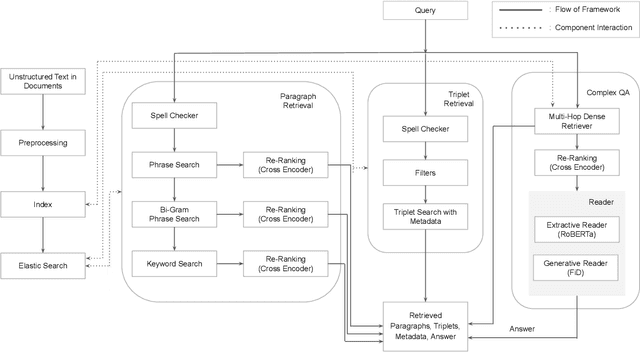
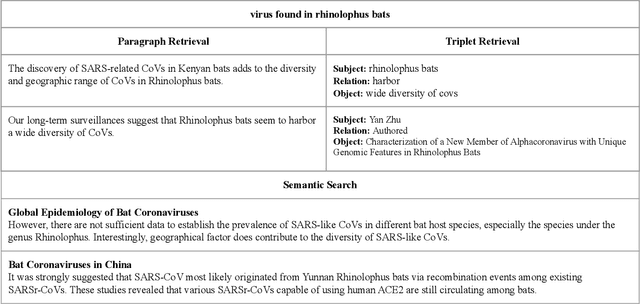
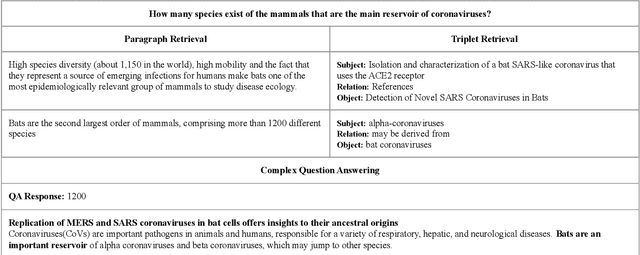
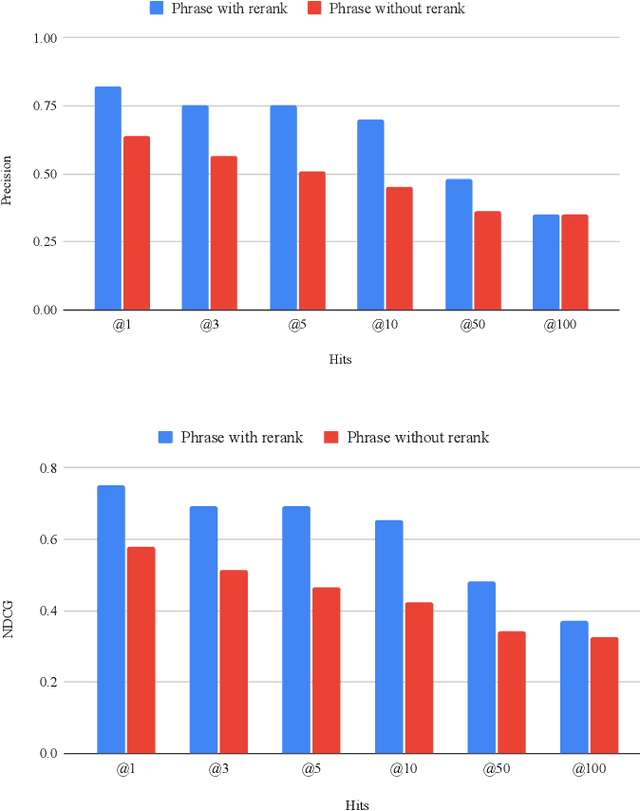
Abstract:Recent advances in the healthcare industry have led to an abundance of unstructured data, making it challenging to perform tasks such as efficient and accurate information retrieval at scale. Our work offers an all-in-one scalable solution for extracting and exploring complex information from large-scale research documents, which would otherwise be tedious. First, we briefly explain our knowledge synthesis process to extract helpful information from unstructured text data of research documents. Then, on top of the knowledge extracted from the documents, we perform complex information retrieval using three major components- Paragraph Retrieval, Triplet Retrieval from Knowledge Graphs, and Complex Question Answering (QA). These components combine lexical and semantic-based methods to retrieve paragraphs and triplets and perform faceted refinement for filtering these search results. The complexity of biomedical queries and documents necessitates using a QA system capable of handling queries more complex than factoid queries, which we evaluate qualitatively on the COVID-19 Open Research Dataset (CORD-19) to demonstrate the effectiveness and value-add.
3D Conditional Generative Adversarial Networks to enable large-scale seismic image enhancement
Nov 16, 2019

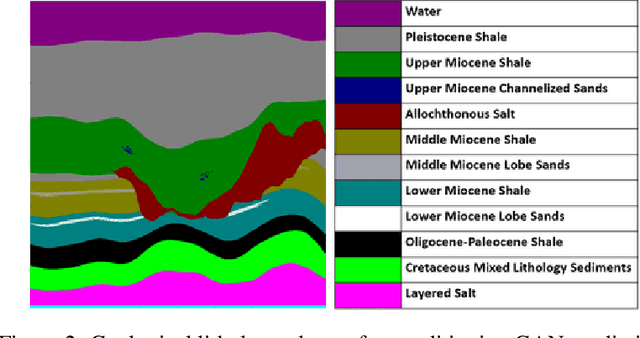

Abstract:We propose GAN-based image enhancement models for frequency enhancement of 2D and 3D seismic images. Seismic imagery is used to understand and characterize the Earth's subsurface for energy exploration. Because these images often suffer from resolution limitations and noise contamination, our proposed method performs large-scale seismic volume frequency enhancement and denoising. The enhanced images reduce uncertainty and improve decisions about issues, such as optimal well placement, that often rely on low signal-to-noise ratio (SNR) seismic volumes. We explored the impact of adding lithology class information to the models, resulting in improved performance on PSNR and SSIM metrics over a baseline model with no conditional information.
 Add to Chrome
Add to Chrome Add to Firefox
Add to Firefox Add to Edge
Add to Edge